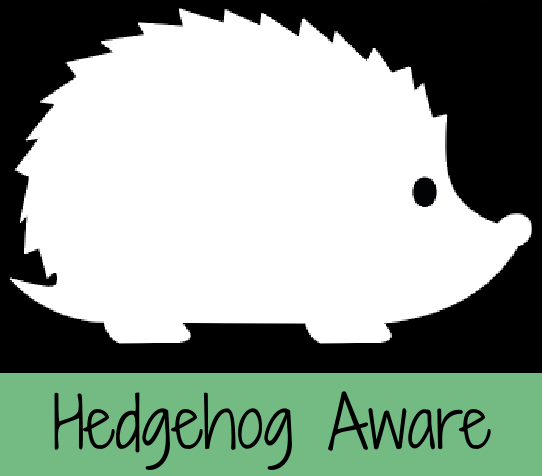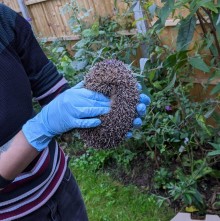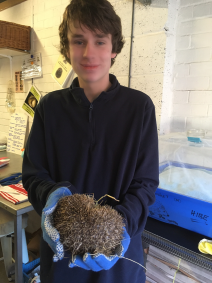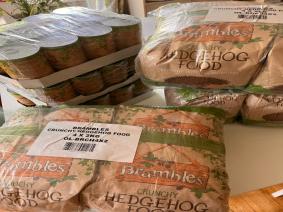





On this page, I have some key facts about hedgehogs, and how to support them throughout the year, including feeding, garden safety, hibernation, and emergencies. There is a document you can download under each section if you would like more detailed information.
Please take action right now to help the UK’s hedgehogs survive and thrive - follow the top tips here, share this page, and get involved. Thank You!


In July 2020, the UK hedgehog was finally included in the International Union for the Conservation of Nature's (IUCN) Red List for British Mammals, meaning they are in danger of extinction. Their numbers have been in steep decline since the 1950's when there was an estimated 36 million, to under a million at the present time. The decline, particularly in rural areas is showing no signs of slowing,and if action isn’t taken now to protect them, it is feared within 10 years these beautiful prickly mammals will have disappeared altogether. To find out more about the State of Britain's Hedgehogs, visit Hedgehog Street.
There are many reasons for this decline as I mention in my video, including the use of pesticides, more vehicles on the road, cutting back hedgerows, gardens being over-tidied and paved over, as well as an increase in fences with no ‘highways’ for hedgehogs to pass through.
Hedgehogs are protected in England, Scotland, and Wales under the Wildlife and Countryside Act 1981, and the Wildlife (NI) Order 1985, in Northern Ireland. This means it is against the law to kill and/or trap hedgehogs by the methods listed in the act which include snares, crossbows, live decoys, traps, snares, or nets, poisoning, artificial lights, mirrors or devices which may dazzle them. Download this information leaflet for more information on hedgehogs and the law.
As already detailed on the Campaigns Page, there are lots of easy ways you can help hedgehogs survive and thrive, from making a ‘hedgehog friendly’ garden (growing native plants for ground cover, escape routes on ponds, log piles, making a 13cm gap in your fence) to checking for them before you start to strim or mow. Download this information leaflet which contains 5 Top Tips for creating a hedgehog friendly garden.
Having accurate information about what to look out for, and how to help is essential - there are many myths around which can be harmful to hedgehogs, so I hope to dispel those here so you can be assured the action you’re taking really will make a positive difference to these beautiful prickly mammals.
Hedgehog's natural diet consists mainly of beetles and caterpillars. Very rarely, only if they are starving, will they turn to slugs and snails. If you think you may have hedgehogs in your garden, you can help them out by giving them supplementary food (meaty cat/dog food, or kitten biscuits) and fresh water each day.
It's important that food is kept separate to where they may be sleeping and/or hibernating. The best food to put out is meaty cat or dog food, and non-milk based kitten biscuits (not treats) with a high meat content, but please read the labels carefully – even some ‘specialist’ hedgehog food on sale can be dangerous to hedgehogs if contents include things like Mealworms, Sunflower hearts, Black Soldier Fly Larvae (Calciworms), and Peanuts. The hedgehogs visiting my garden are often treated to Brambles Crunchy Hedgehog Food. If in doubt, just leaving shallow dishes of water out each day - these will help keep a hedgehog hydrated, and that can be a lifesaver.

I just want to give Brambles Pet and Wildlife a special mention. After seeing my feature on the BBC One Show in May, they very kindly donated all this special wet and dry hedgehog food to the rescue that I take poorly hedgehogs to, and fundraise for. This is so generous, and will go a long way to helping the rescue feed all the hedgehogs they look after with good quality hedgehog food.
To find out more about their food and why it's so special, please visit them at Brambles Pet and Wildlife.
The most important thing for hedgehogs, though, is fresh water daily, throughout the year, so a few shallow bowls dotted around the garden could be a lifesaver for them. If you do decide to put down food and/or water, please remember this is a long-term commitment - hedgehogs will often come back to places where they know there is a guaranteed source of food, so it’s essential you keep making food and/or water available to them once you’ve started.
Download this information leaflet on Feeding for more detailed information on feeding, making a feeding station, and danger foods for hedgehogs.
Mating season for hedgehogs can be anytime from mid-April through to June. It will be easy to tell if mating is happening as you will hear lots of noisy huffing and puffing in the garden as the male circles the female for attention!
The gestation period is around 32 days, and up to 4 hoglets can be born in the first litter. Sometimes there can be a second litter in August/September but these will be even more vulnerable as they will need to quickly build their weight to survive hibernation.
It is absolutely essential not to disturb a hedgehog nest – please always check carefully before mowing, strimming, or moving things around in the garden. If a nest is disturbed, Mum may leave and not return, so the chances of hoglets surviving without here is virtually zero.
Download this information leaflet for more details.
Download information on hedgehog houses here
There are many rescue centres across the UK who take in and help sick or injured hedgehogs or hoglets. All are run on a voluntary basis, so please be patient if you have difficulty getting through to one on the phone. They do amazing work but rely 100% on donations. I have raised hundreds of pounds for my nearest one in Torfaen and I know that every penny goes towards equipment, food, and medicines needed to help the hedgehogs in their care.
If you see a hedgehog out in the day and not 'moving with purpose', or it appears sick or injured, please call the BHPS Helpline on 01584 890 801 who will try to find a nearby rescue. Alternatively check this website to locate your nearest rescue.